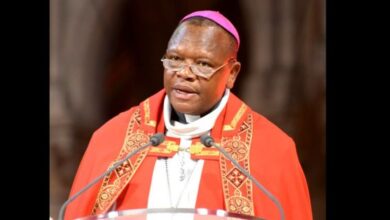OSINACHI’S HUSBAND SENTENCED TO DEATH: The Shocking End to a Gospel Star’s Tragic Marriage

For three agonizing years, the world waited for justice. Yesterday, it finally arrived.
In a packed courtroom in Abuja, justice was served with a heavy gavel—Peter Nwachukwu, the husband of late gospel sensation Osinachi Nwachukwu, was sentenced to death by hanging for her murder. The verdict marked the end of a harrowing legal battle that exposed the dark underbelly of domestic violence, hidden behind the facade of a celebrated marriage.
Osinachi, the angelic voice behind the hit song “Ekwueme,” was more than just a singer—she was a symbol of faith, hope, and inspiration to millions. But behind closed doors, her life was a nightmare of abuse, control, and unimaginable suffering.
Now, her abuser will pay the ultimate price.
Read: ASUU Rejects FG’s N50 Billion Allowance Claim, Demands Full Funding of Universities
The Trial That Shook a Nation
The case against Peter Nwachukwu was nothing short of a national spectacle. From the moment Osinachi’s death was announced in April 2022, whispers of domestic violence swirled. But it wasn’t until her children, friends, and church members broke their silence that the horrifying truth emerged.
The prosecution presented 17 witnesses, including Osinachi’s own children, who recounted years of brutal beatings, psychological torture, and systematic isolation. One of the most chilling testimonies revealed that Nwachukwu forced his wife out of a moving car, locked her up at home, and even recorded their children’s cries to torment her further.
Despite Nwachukwu’s desperate attempts to deny the allegations—bringing in four witnesses to vouch for his character—the evidence was overwhelming. Justice Njideka Nwosu-Iheme, in her ruling, stated that the prosecution had proven beyond reasonable doubt that he was responsible for Osinachi’s death.
A Marriage Built on Fear, Not Love
Osinachi’s story is a painful reminder of how domestic violence thrives in silence. For years, she endured abuse while the world only saw her radiant smile and heard her powerful voice.
Her husband didn’t just hit her—he controlled every aspect of her life. He denied her access to her own money, leaving her to beg for basic necessities. He cut her off from her family, forbidding her mother and siblings from visiting. He threatened their children into silence, ensuring no one would speak out.
Even in death, the cruelty continued. Osinachi’s family alleged that Nwachukwu delayed medical treatment when she collapsed, possibly sealing her fate. By the time she was rushed to the hospital, it was too late.

Why This Verdict Matters
Nigeria has long struggled with weak enforcement of domestic violence laws. Many abusers walk free, shielded by societal stigma, victim-blaming, and a flawed justice system. But Osinachi’s case was different.
The sheer brutality of her ordeal, combined with her fame, forced the nation to pay attention. Her death sparked nationwide outrage, leading to protests, petitions, and demands for stricter laws against domestic abuse.
This verdict sends a powerful message: No one is above justice. Not a husband. Not a father. Not even a man who hid behind religion while committing unspeakable acts.
The Church’s Role in the Tragedy
One of the most troubling aspects of this case was the role of the church. Osinachi and her husband attended the Dunamis International Gospel Centre, led by Pastor Paul Enenche. Yet, despite the abuse, she remained silent—likely due to religious pressure that teaches women to endure suffering in marriage.
After her death, Pastor Enenche expressed shock, claiming he had no idea about the abuse. But many have questioned: How could such violence go unnoticed in a close-knit church community?
This case forces us to confront an uncomfortable truth: Too many religious institutions enable abuse by preaching submission over safety. Osinachi’s tragedy should be a wake-up call for churches to actively protect victims, not silence them.
What Happens Next?
While the death sentence brings a sense of closure, it doesn’t erase the pain. Osinachi’s children—who bravely testified against their father—now face a life without both parents.
Nwachukwu’s lawyers may still appeal, dragging the case further. But for now, justice has been served.
As for Nigeria, the fight against domestic violence is far from over. Laws like the Violence Against Persons Prohibition (VAPP) Act exist, but enforcement remains weak. More women (and men) suffer in silence, fearing stigma or retaliation.
Osinachi’s legacy must be more than just her music. It must be a movement—a demand for change, for protection, and for a society where no one has to endure what she did.
Final Thoughts: A Voice Silenced, But a Message That Lives On
Osinachi Nwachukwu’s voice once filled churches with hope. Now, her story fills courtrooms with purpose.
Her death was not in vain. Because of her, more women may find the courage to speak out. Because of her, more abusers may think twice before raising their hands. Because of her, Nigeria may finally take domestic violence seriously.
Justice has been served. But the fight continues.
Rest in peace, Osinachi. Your song may have ended, but your echo will never fade.




